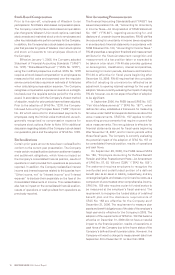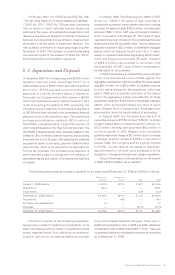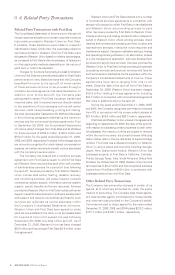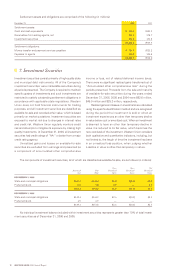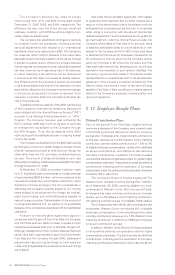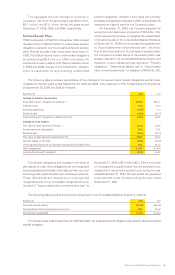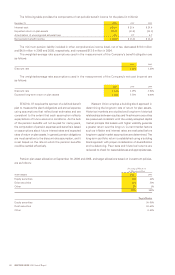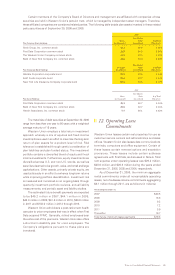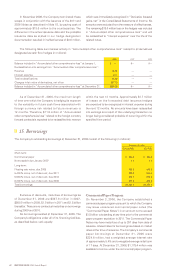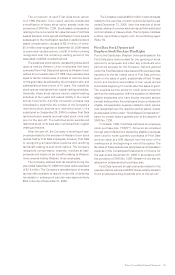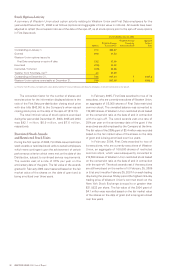Western Union 2006 Annual Report Download - page 84
Download and view the complete annual report
Please find page 84 of the 2006 Western Union annual report below. You can navigate through the pages in the report by either clicking on the pages listed below, or by using the keyword search tool below to find specific information within the annual report.WESTERN UNION 2006 Annual Report 82
The Company’s effective tax rates on pretax
income were 32%, 31%, and 32% for the years ended
December 31, 2006, 2005, and 2004, respectively. The
effective tax rate over the three periods remained
relatively constant, with 2005 benefiting slightly from
certain state tax adjustments.
The Company has established contingency reserves
for material, known tax exposures, including potential
tax audit adjustments with respect to our international
operations, which were restructured in 2003. The Company’s
tax reserves reflect what it believes to be reasonable
assumptions as to the likely resolution of the issues involved
if subject to judicial review. While the Company believes
that its reserves are adequate to cover reasonably expected
tax risks, there can be no assurance that, in all instances,
an issue raised by a tax authority will be resolved at
a financial cost that does not exceed its related reserve.
Any difference from the Company’s position as recorded
in its financial statements and the final resolution of a tax
issue will be reflected in the Company’s income tax expense
in the period during which the issue is resolved. Such
resolution could also affect the Company’s effective tax
rate in future periods.
To address certain tax aspects of the 2003 restructuring
of the Company’s international operations, discussions
were initiated with the Internal Revenue Service (“IRS”)
pursuant to its Advance Pricing Agreement, or “APA,”
Program. The Company, however, was notified by the
IRS in October 2006 that it will not be able to conclude
an arrangement acceptable to the Company through
the APA Program. Thus, the tax aspects of the 2003
restructuring will be addressed as part of ongoing federal
income tax audits.
The Company has benefited from the 2003 restructuring
by having its income from certain foreign-to-foreign money
transfer transactions taxed at relatively low foreign tax
rates rather than the U.S. and state combined statutory
tax rate. The amount of taxes attributable to such rate
differential cumulatively totaled approximately $210.8 million
through December 31, 2006.
At December 31, 2006, no provision had been made
for U.S. federal and state income taxes on foreign earnings
of approximately $829.5 million, which are expected to be
reinvested outside the United States indefinitely. Upon
distribution of those earnings in the form of dividends or
otherwise, the Company would be subject to U.S. income
taxes (subject to an adjustment for foreign tax credits),
state income taxes, and withholding taxes payable to
various foreign countries. Determination of the amount of
unrecognized deferred U.S. tax liability is not practicable
because of the complexities associated with its hypothetical
calculation.
Pursuant to a tax allocation agreement signed in
connection with the spin-off from First Data, the Company
and First Data each are liable for taxes imposed on their
respective businesses both prior to and after the spin-off.
Although management of the Company believes that such
taxes have been appropriately apportioned between
First Data and the Company through 2006, subsequent
adjustments may occur as tax filings for such years are
made with all applicable tax jurisdictions and such filings
are finalized.
Also under the tax allocation agreement, with respect
to taxes and other liabilities that could be imposed as a
result of a final determination that is inconsistent with the
anticipated tax consequences (as set forth in the private
letter ruling) in connection with the spin-off (and certain
related transactions) if such transactions do not qualify for
tax-free treatment under the Internal Revenue Code, the
Company will be liable to First Data (i) for any such taxes
or liabilities attributable solely to actions taken by or with
respect to the Company, and (ii) for 50% of any such taxes
or liabilities (A) that would not have been imposed but for
the existence of both an action by the Company and an
action by First Data or (B) where the Company and First
Data each take actions that, standing alone, would have
resulted in the imposition of such taxes or liabilities. The
Company may be similarly liable if it breaches certain
representations or covenants set forth in the tax allocation
agreement. If the Company is required to indemnify First
Data for taxes incurred as a result of the spin-off being
taxable to First Data, it likely would have a material adverse
effect on the Company’s business, financial position and
results of operations.
|| 11. Employee Benefit Plans
Defined Contribution Plans
Prior to the spin-off from First Data, eligible full-time
non-union employees of the Company were covered under
a First Data sponsored defined contribution incentive
savings plan. Employees who made voluntary contributions
to this plan, received up to a 3% Western Union matching
contribution, service related contributions of 1.5% to 3%
of eligible employee compensation, certain other additional
employer contributions, and additional discretionary
Company contributions. In addition, First Data provided
non-qualified deferred compensation plans for certain highly
compensated employees. These plans provided tax-deferred
contributions, matching and the restoration of Company
contributions under the defined contribution plans otherwise
limited by IRS or plan limits.
The Company’s Board of Directors approved The
Western Union Company Incentive Savings Plan (“401(k)”)
as of September 29, 2006, covering eligible non-union
employees of Western Union after the spin-off date.
Employees that make voluntary contributions to this plan
receive up to a 4% Western Union matching contribution.
All matching contributions are immediately 100% vested.
The Company also has a 401(k) plan covering its union
employees. Western Union contributes 4% of eligible
employee compensation. Union employees who make
voluntary contributions receive up to a 1.5% Western Union
matching contribution in addition to a $650 per employee
lump-sum contribution per year.
In addition, Western Union’s Board of Directors adopted
a non-qualified deferred compensation plan for highly
compensated employees. The plan provides tax-deferred
contributions, matching and the restoration of Company
matching contributions otherwise limited under the 401(k).




